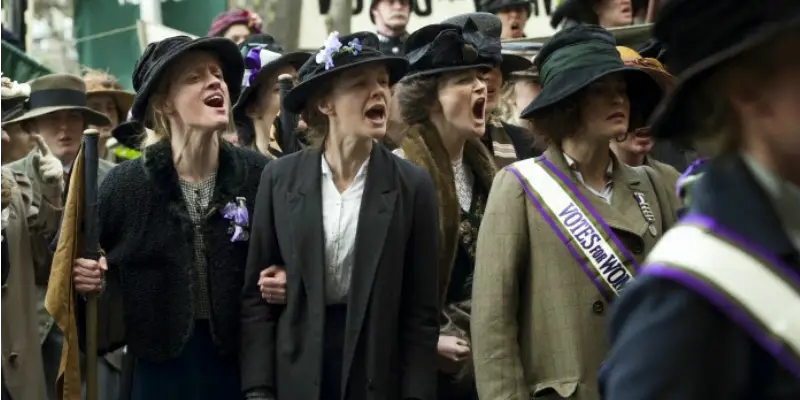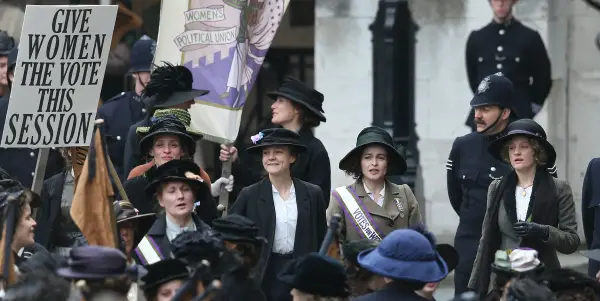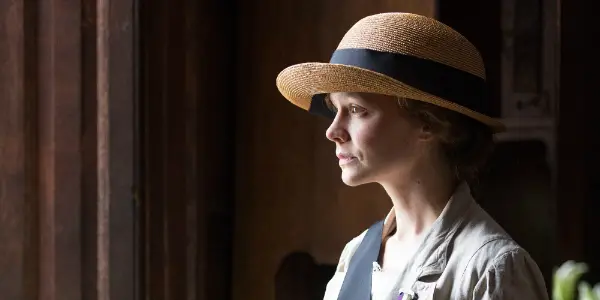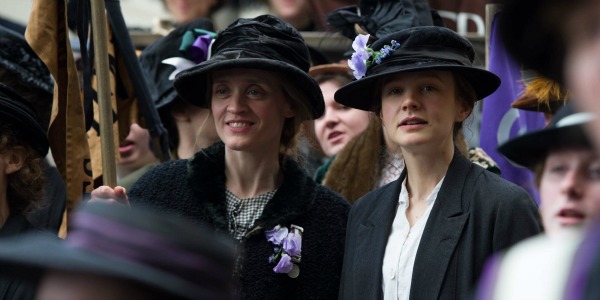SUFFRAGETTE: A Gritty & Bold Re-telling Of History

Becky spends her days working in TV and she spends…
Suffragette has been grabbing the attention of the media and public long before it was even released. First, there were rumours that there were to be no women of colour in the film (this is true). Then there was the at best ignorant, at worst painfully offensive campaign led by Meryl Streep and the rest of the cast, featuring photos of them wearing t-shirts stating ‘I’d rather be a rebel than a slave’. Then finally, there was the controversy of security guards aggressively dragging and manhandling women’s rights protesters off the red carpet at the film’s premiere.
This was all before the film even opened. It seemed Suffragette already had a lot to live up to. Director Sarah Gavron explains her reasoning for leaving out the stories of WOC (women of colour) here, and whilst I’m glad she explained it, I’m not sure if it’s justifiable. What is clear, however, is Gavron’s unwavering conviction to present the story of Suffragette from a working class, grassroots level – exploring the sacrifices they made in order to gain the seemingly simple right to vote.

The film begins in 1912 as factory launderette worker Maud Watts (a fictional character played by Carey Mulligan) is introduced to the suffragette movement through a woman she meets at work, Violet (Anne-Marie Duff). Violet is due to speak at parliament, on the awful working conditions of the woman from the launderette, in the hopes that it will persuade the government to vote for a referendum on women’s voting rights. In a turn of events that some may call fate, Maud ends up speaking for Violet and (with some trepidation) makes her first steps in joining the suffragette movement.
What follows is a game of cat and mouse between the British government and the suffragettes – headed by real life suffragette Emmeline Pankhurst (Meryl Streep). Of course, we already know the outcome – but Suffragette keeps us on the edge of our seat by bringing in conflicts of class, loss of family and gut wrenching scenes of brutality. We all know where the film ends, but it’s the undulating journey which ensures that we keep watching.
Deeds Not Words
Suffragette’s entire world is claustrophobic, chaotic and confusing and the cinematography does a fantastic job of mirroring these feelings. Gavron expertly uses close-ups, often handheld, to keep us close to Mulligan and to force us to feel the same sense of bewilderment that she does. Initially, we are treated to wide-shots of London (the white washing hung against Maud’s street is a stunning image, reminding us of the ‘women’s work’ all around us), but as Maud begins to feel more disillusioned by her situation, the shots begin to tighten in on her face, shaky and obscure. In times of clarity for Maud, when she is working at the WSPU (Women’s Social & Political Union) and with her son, the frame becomes wider and far more constructed. Gavron also makes excellent use of sound, keeping the music to a minimum and often opting for silence within particularly emotional sequences.
Performances from Ben Whishaw as Maud’s misogyny-personified husband, Helena Bonham Carter as the chemist-turned-bomb-maker and Brendan Gleeson as Detective Patriarchy are all strong performances (despite their obviously archetypal roles), but it’s Mulligan’s performance as Maud that stands head and shoulders above the rest.
Versatile as ever, Mulligan outdoes herself in Suffragette, particularly as her character evolves and grows so much over the course of the film. It’s heavily implied (if not explicitly) that Maud has suffered at the hands of her sexually abusive employer for many years, and her decision to join the suffragette movement is in part spurred on by his relentless pursuit of a younger girl at the factory. The fire in Mulligan’s eyes when she makes her decision shines fiercely and she is utterly believable. This is a woman who has had enough.

As powerful scenes in cinema go, there won’t be many which rival Maud being force-fed in prison. After embarking on hunger strikes (as many suffragettes did), Maud is subjected to the torture-esque procedure of force-feeding. The lack of sound, with the exception of Maud’s screams and grunts, is another example of Gavron’s accomplished directing. It’s truly horrifying, and even worse when we remember that this really happened.
Despite the vast majority of Suffragette showcasing gritty British realism and heart-stopping moments, there are a few areas in which it fell slightly short. Whilst the first half of the film felt pacy and exhilarating, the momentum seemed to drop off halfway through which meant the last forty minutes felt somewhat lacking – as if the film didn’t really know where it was going.
Eventually, we reach the Epsom Derby and the tragic death of Emily Davidson. Her death and the non-resolution of the film felt accomplished, but it took a little bit of wading to get there. Also, and I really don’t want to say this but, Meryl Streep as Emmeline Pankhurst was over-hyped, and inevitably just disappointing. Her performance is more cameo than a role, and certainly took me right out of the film. It was slightly jarring, and rather than seeing her as esteemed feminist Pankhurst, I only saw her as Meryl Streep in 1920s clothing.
“You Can’t Stop Us All”
Suffragette, with or without the controversies that followed it, will always have been under closer scrutiny than most other films. Suffragette tells the story of the first feminists, those who fought and won their rights to vote – it’s a part of history that no-one wants to be on the wrong side of.
There always seemed to be a fear that Gavron would approach the story with a watered down version of events to appeal to a mass audience. We can safely say, this did not happen – Gavron and screenwriter Abi Morgan went a step further and examined the class struggles within the ranks of the suffragettes. Pankhurst, the most famous and also an incredibly middle class suffragette, is physically raised above the other women when she interacts with them – signifying her power status throughout.
Equally, we see the suffragette wife of an MP released from prison because they can afford to have her released. Alice, the wife, begs for her husband to release the other women too – claiming she can’t go free if they don’t, it’s not fair. This, surely is the point. Middle class suffragettes lost very little in the fight, like Pankhurst they had money and means to go into hiding or pay their way out of prison. Violet and Maud, the working class women, lose their families, jobs and homes because of their connection to the suffrage movement.

As discussed earlier, the lack of ethnic minority women was surprisingly and frankly, really disappointing: although it is true that the majority of suffragettes in the UK were white, the character of Maud was invented for the film, and so it seems suspect that a WOC could not also have been written in. This is, after all, a dramatization. Having said this, Suffragette avoids falling into the category of a ‘white-feminist’ film purely because of the class divide being a metaphor for modern day feminism. The current divide between ‘academic’ feminists and the alienation of everyday working women can be seen clearly within the divide in the suffragette movement. We have only come so far, sisters.
Suffragette is, above all else, a social and political commentary on the treatment of women in history, and one of the things it does best is to present us with solid female friendships. Maud and Violet’s friendship and the camaraderie between the women is refreshing. Here we have a film where women are helping each other, standing up for their rights and learning not to back down. Women as characters with agency and autonomy, not objects for male consumption – and of course, it scores highly on the Bechdel test.
We Can’t Give Up
I expect that many people will be unhappy with Suffragette, but hopefully this will be the first film of many that are written, directed and about women. The more female oriented stories we have, the more chance we have to get it right. Suffragette, in my opinion, definitely does not get it wrong but there is undoubtedly room to grow beyond this. It’s a starting point. Personally, I loved it.
Despite its issues, Suffragette needed to be made and needs to be seen by everyone. This is the first, and certainly the most powerful, dramatization feature film detailing the absolute hell that British suffragettes went through in order to gain something so simple. As with any film, there are elements of fiction, but Suffragette is a fantastic resource about a period of history that remains largely unspoken about. It’s truly grim, but when you watch it you must remember: this really happened. The rolling list before the credits, details when each country gave the vote to women. In Saudi Arabia – they are still waiting. In a sense, Suffragette then becomes about the present, not the past. Oppression is still happening.
It’s about so much more than voting. It’s about everyone being granted the same rights in society, regardless of their gender.
What were your views on Suffragette? How does it match up to previous incarnations of the British or American suffrage movement?
Suffragette is currently on theatrical release in the UK and will be on general release in the US on October 23rd. For international release dates check here.
(top image: Suffragette – source: Focus Features)
Does content like this matter to you?
Become a Member and support film journalism. Unlock access to all of Film Inquiry`s great articles. Join a community of like-minded readers who are passionate about cinema - get access to our private members Network, give back to independent filmmakers, and more.
Becky spends her days working in TV and she spends every other minute writing about cinema, TV & feminism. Based in London, she also likes drinking gin, re-watching 'The X Files' and writing about on-screen representation and all manner of things over at femphile.com










